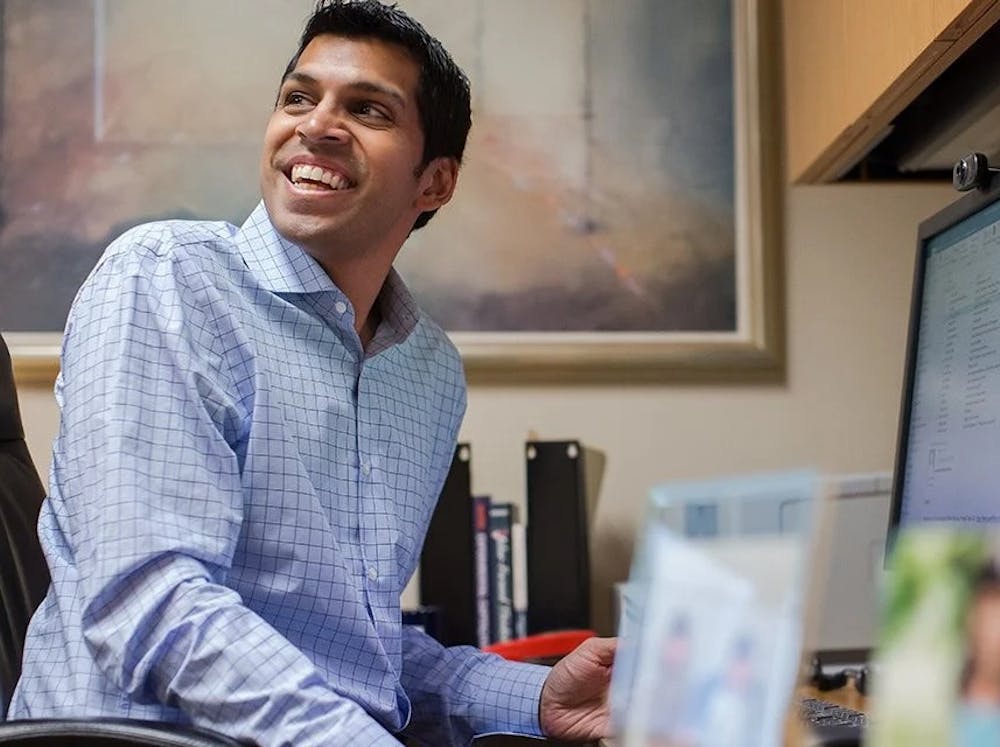In 2023, a White House intern read aloud a clever new poem to White House CHIPS Coordinator Ronnie Chatterji.
Its humor and niche references amused the longtime Duke professor. However, he soon discovered that ChatGPT generated the intern’s crafty poems, marking his first encounter with the tool.
Now, as the inaugural chief economist of OpenAI — which develops ChatGPT — Chatterji plans to bring his interdisciplinary view of technology to help lead a company at the frontier of the AI revolution.
Chatterji, Mark Burgess & Lisa Benson-Burgess distinguished professor of business and public policy, sat down with The Chronicle to discuss his new role at OpenAI and how his time at Duke and in the White House influenced his perspective on the economic impact of emerging technologies.
From Duke professor to White House CHIPS coordinator
Chatterji began teaching at the Fuqua School of Business in 2006 as assistant professor of strategy. Four years later, he made his debut in the White House as a senior economist for the Council of Economic Advisers amid lasting economic implications from the 2008 recession. At the time, the Obama administration’s economic team had injected hundreds of billions of dollars of stimulus into the economy, yet jobs remained scarce and growth sluggish.
“We were seeing budget sequestration, other things that were really going to set the background for all the fiscal and economic policy debates of the next five or 10 years,” Chatterji said. “... My focus on entrepreneurship and small business really took me to figure out how the financial crisis was affecting small firms.”
Chatterji recalled that when he was in graduate school, people “didn't think much” about the global economy being deglobalized or threats to supply chains. Having won the Cold War, the U.S. was “a unitary power in global economics.” Even during his time in the Obama administration, Chatterji explained there was less concern about the fragility of global supply chains.
By 2021, disruptions by the COVID-19 pandemic had made the vulnerability of global supply chains more apparent. That year, he began serving as the Department of Commerce's chief economist in the Biden administration, where his efforts were focused on applying economic analysis to the department’s diverse bureaus and agencies.
For Chatterji, that meant asking questions not many had been asking.
“What do we know about why these things aren't showing up when they should?” he asked of lumber, steel and semiconductors. “What's the impact on the economy, and how can we help the different bureaus in the Commerce Department and the Secretary make sense of the solutions?”
Chatterji noted that the country was making “about 0%” of the most advanced chips and “losing market share” in several other areas.
“You might be making the chips or fabbing them in Taiwan — they might be designed in the United States, but the equipment that is used to do the lithography to make them is made in the Netherlands, and the materials used in the process come from Japan,” he said. “... In a global economy, if we can't get the stuff we need, how are we supposed to rewire supply chains to produce semiconductors?”
These concerns demanded a solution that would promote the safety and security of the U.S. chip supply.
The answer came in the form of the CHIPS and Science Act: a $280 billion investment in scientific research, emerging technologies and manufacturing, including $52 billion in subsidies for semiconductor manufacturing.
In 2022, Chatterji transitioned to the role of Acting Deputy Director of the White House National Economic Council and CHIPS Coordinator to help lead the implementation of the act. Its national security benefits — namely, helping secure the U.S. chip supply — won over Congress, allowing the act to pass that same year by a bipartisan coalition.
When reflecting on the future of technology policy, Chatterji noted that unlike other issues, AI has transcended political “battle lines.” In making this distinction, he emphasized the necessity of having continued conversation on the implications of AI for the country “regardless of the outcome of the election.”
“We're building alliances around the world, from the United States perspective, to develop these technologies in ways that have to recognize that control over quantum computing or AI is also a matter of national security,” Chatterji said.
As he takes on his new role, Chatterji will address these issues from a new vantage point in the private sector.
OpenAI and the impact of emerging technologies
Get The Chronicle straight to your inbox
Sign up for our weekly newsletter. Cancel at any time.
Chatterji is no stranger to the many AI models and companies striving for the next great innovation. But OpenAI, in his view, is the “Kleenex for AI.”
“The fact that people say, give me a Kleenex, regardless of whether it is that brand, is sort of illustrative of the fact of how powerful it is,” Chatterji said. “And when a lot of people think about AI, they think about OpenAI.”
OpenAI, which entered the market in 2015, is now valued at $157 billion and is one of the world’s most valuable private firms.
To Chatterji — who noted the company’s roots as a “lab and a startup” — the opportunity to serve as the inaugural chief economist represents the chance to do “something that hasn’t been done before.” He views OpenAI as a company that encourages “being the first.”
“Meeting the people during the [hiring] process and realizing that they were at the top of their game and really wanted to push even further … that was both humbling to me, but also pretty exciting,” Chatterji said, noting that he believes that the “interdisciplinary lens” through which he views technology “really matches well with OpenAI.”
In particular, he emphasized the importance of finding sources of patient capital — long-term investment which doesn’t require immediate profits — to fund emerging technologies, which highlights the utility of understanding business beyond just engineering.
He shared that engaging with Duke faculty such as Peter Feaver, professor of political science and public policy, and Bruce Jentleson, William Preston Few professor of public policy and political science, contributed to his understanding of the connection between geopolitics and emerging technologies.
“If you put that all together, those are all things I learned from being at Duke,” Chatterji said. His appreciation for North Carolina, a politically and economically diverse state, has helped shape his view of how technologies should be developed.
When asked about the relationship between job enhancement and job replacement caused by AI, Chatterji outlined two scenarios.
First, when AI can do parts of a job that are “creating less value at a lower margin” and “frees you up” to do a higher-margin task, it plays a complementary role.
Second, “if AI is able to do all your tasks, that’s the replacement story,” Chatterji said, adding that “it’s going to work differently in different kinds of jobs.”
Chatterji noted that economic models often assume workers move industries when a new technology can do a job “more productively.” However, he believes that the government is not set up to provide the training and geographic mobility to “make those things happen.”
“I think that my biggest concern isn’t that there are going to be some jobs that are enhanced by AI, and there’s going to be some jobs that AI can do better than I can do,” he said. “But the question is, can we set up structures in the public and private sectors to do this, to help people make adjustments — to get the training they need to use it better, but also to train for careers that don’t even exist yet?”
Priorities looking forward
Among Chatterji’s interdisciplinary priorities is sustainability, which he defined as “the biggest issue of our time.”
“This question about the direction of AI infrastructure is one of the things that got me so excited about working at OpenAI,” Chatterji said, adding that he’s done research at Duke on the same topic.
AI is an electricity-intensive technology, and companies like Google have acknowledged that the development of AI models has contributed to increased greenhouse gas emissions.
“You see this challenge of harnessing the benefits of this transformative technology, but also meeting our climate goals,” he said. “I think what you’re going to need is a lot of collaboration across public and private [sectors] and universities to come up with some solutions to basically build AI infrastructure that’s sustainable.”
According to Chatterji, research areas for sustainable infrastructure include designing energy-efficient AI accelerator chips and cooling technologies as well as enhancing the production of solar, wind and nuclear energy.
He also discussed AI's potential impact on labor markets, suggesting that “at its very best, AI is going to allow us to be more productive.” He described how generative AI has inspired his thinking about literature and assisted in matching data sets in his job, noting the importance of training to “stay on the cutting edge” of using AI tools.
“Part of my research is going to be understanding under what conditions can AI lead to more human flourishing, and where are the use cases where we need to be a lot more careful,” he explained.
“[So] then, what kind of regulatory environment do we need to build to ensure that AI is conducive to human flourishing?” Chatterji asked.
Now, Chatterji’s challenge begins: to lead the effort to answer some of society’s most pressing economic questions in the age of AI.
Samanyu Gangappa is a Trinity sophomore and local/national news editor for the news department.

Michael Austin is a Trinity junior and managing editor of The Chronicle's 120th volume.

